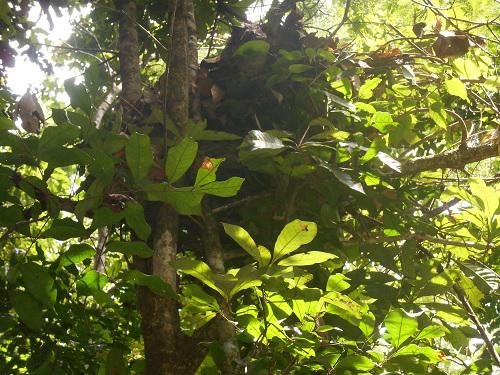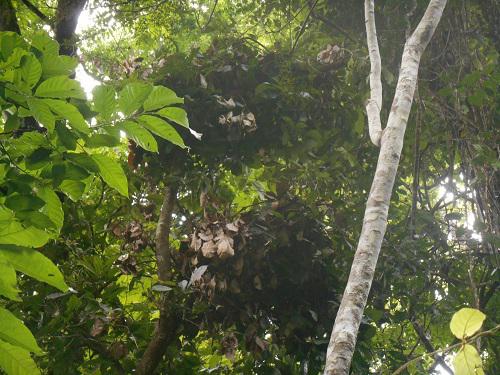Serge Alexis Kamgang
Other projects
15 Aug 2016
Effect of Habitat Variation on the Density of Chimpanzee (Pan troglodytes ellioti) in Mbam and Djerem National Park in Cameroon
11 Dec 2017
Characterization of the Nesting and Feeding Sites of Nigeria-Cameroon Chimpanzee (Pan troglodytes ellioti, Matschie 1914) in Mbam and Djerem National Park: Implications for Population Monitoring
6 Mar 2020
Enhancing the Protection of Chimpanzee (Pan troglodytes ellioti) and Sympatric Mammals Using Automatic Acoustic Recorders in Mbam-Djerem National Park, Cameroon
The project aims to understand the socio-ecology and dynamic of Nigeria-Cameroon chimpanzee in the Mbam Djerem National Park in Cameroon.

Old nest of chimpanzee found in the Mbam Djerem National Park.
Situated in forest/savanna ecotone, the Mbam and Djerem National Park (MDNP) overflows an important biodiversity including in the same time species of forest, savanna and ubiquist and constitute in this fact an important link to the national network of protected areas. The park faces several problems (the ambient poverty, the strong pressure of poaching, overgrazing, the negative impacts of industrial projects in the periphery etc.) that threaten the survival of biodiversity. About 28.694 people live in the periphery and depend only on park resources for their subsistence. It is an excellence site of conservation and shelter a species of great apes threatened with extinction according to the UICN. This human presence accentuates the pressure on the chimpanzee and especially the subspecies Pan troglodytes ellioti called the Nigerian-Cameroon chimpanzee (NCC). The NCC is the most endangered of all currently recognized chimpanzee subspecies, with a total remaining population of between 3,500 and 9,000 living in forested habitat to the north of the Sanaga River in MDNP in Cameroon, the eastern edge of Nigeria, and in forest fragments in the Niger Delta and south-western Nigeria (Morgan et al., 2011). This primate if manage properly by the Government, NGOs and research institutions may contribute to the local development on the economic, social and ecologic plan. But the MDNP lack crucial information’s to facilitate the sustainable management of Chimpanzee. These information’s includes the decay rate of the nest and density of chimpanzees, their community/group structure, their feeding behaviour, their habitat characterization (home range), the human pressure and other factors that determine their community dynamics.

A group of two nests found in a nesting site in Mbam Djerem National Park.
So, the project will effectively contribute to the conservation of the Nigeria-Cameroon chimpanzee on the one hand and the Mbam and Djerem National Park biodiversity on the other. The chimpanzee is classified by IUCN as an endangered species and fully protected (Class A) under the forestry law in Cameroon. The result of this work will make available to managers information to facilitate the effective management of this species. This will be relevant information to safeguard and to lay the groundwork for an eventual habituation of chimpanzee in the Mbam and Djerem National Park.